
_wqm_20210928_sw_oc_property_christian%20feature%20article.jpg?crc=4073170834) How Our Volunteers Make Third Spaces & Create Community
How Our Volunteers Make Third Spaces & Create Community
By Cara Coates, Volunteer Engagement Specialist
Since 1989 Missourians have been connecting with each other through the Missouri Stream Team Program. Our volunteers create safe spaces and revive community connections in the era our media is calling an “epidemic of loneliness.”
People all over the world are feeling more disconnected from each other and their environment than ever before. Everything in our world now is about convenience and efficiency. We have the ability to skip the line, order ahead, donate online, and go, go, go. But what I have found is the more I go, go, go, the less time I take for the things that really matter. Things like third spaces.
A third space is a place that isn’t your house and isn’t your work place. It’s that third place you go to find your community. You may go to a local coffee shop every morning; this is a third space. You might be a regular server at a community soup kitchen every evening; this is a third space. And most likely for many of you, you may have a group of friends you meet in public spaces every weekend to clean up trash; this is a third space. You might meet Tuesday evenings in the spring and summer to plan and plant natives in your neighborhood with your Stream Team; this is a third space.
Third spaces are very powerful; they are the places where we find true connection. They are places where we find our deepest sense of community, because the people who share those spaces with us are often there for the same reason we are: to connect and to give back. It is human nature to want to be a part of our local community, to protect it and to better it.
_lpu_20210724_jacks_fork_river_shannon_county%20feature%20article.jpg?crc=3764921568)
Missouri Stream Team volunteers have been perfecting the art of third spaces for a long time. When Stream Team #1 was started, the Roubidoux Fly Fishermen already had their third space: Roubidoux Creek. These fly fishers loved their third space so much, a beautiful stream with excellent recreational abundance, that when they saw trash accumulating over the years, they had to do something about it: their sense of community demanded it. And because through this space they were connected to their environment and each other, they were able to band together as an amazing force to clean up their beloved creek. This snowballed the movement that became our program: Missouri Stream Team.
Since then, our Teams in each region have grown. Starting often as family groups that want to get their children out in nature, these family groups often grow into teams of families, neighbors, and broader community members who are brought in by their love of a third space and the connection they find there. That connection might be a litter pick-up, a native planting, honeysuckle removal, or water quality monitoring, which are some of the most popular Stream Team activities.
But really, what our volunteers find again and again when they participate in these activities together is an inclusive and eager culture, and a network of volunteers that are so passionate about Missouri’s streams that they are willing to include any and all Missourians in the care of our natural resources. It’s a remarkable thing to witness.
If you’re reading this, and you haven’t already joined our program, I encourage you to do so. There are so many amazing champion volunteers out there across the state, waiting to help new volunteers get involved in our program. If you are reading this, and you are already a dedicated member of our program, thank you for all that you do, and know that we see your heartfelt advocation for your third spaces.
Save the Dates!
Stream Team Trip Leader Special Handling Seminar, Leader Scouting Seminar, & Capstone Clean-Up
Stream clean-up activities are very important for the environment and for the community. They best serve the community when volunteers are recruited from the neighborhood. It is critical therefore to make sure that those volunteers have a fun, successful, and safe day. Sending out team leaders with groups of volunteers is the best way to make this happen. The same thing is true for any group working with volunteers outside. Whether is planting, seed collecting, nature journaling, or birdwatching, it is best to have team leaders who have thought about how to respond to the many emergencies that may arise.
Fortunately, it is rare that volunteers run into problems, but things do happen. Advanced scouting helps prevent problems from arising in the first place. Well prepared team leaders can help volunteers avoid hazards and can address any problems that do occur.
Greenway Network’s Team Leader Academy seeks to establish a cadre of certified team leaders across the State of Missouri. A group of people ready and willing to assist in leading volunteer activities. The academy is focused on preparing team leaders for trash clean ups with volunteers. However, the basic special handling seminar is an invaluable resource for anyone working with volunteers in the outdoors.
Basic Team Leader Special Handling Seminar covers what to do when encountering hazards like barrels, drug paraphernalia and sharps in the outdoors. It also provides an over-view of issues like trespassing, poaching, pollution, and medical emergencies. Participants leave with a packet of resources and specially equipped team leader backpack.
Team Leader Scouting Seminar is a hands-on day spent pre-scouting sites with expert scouts. Participants will learn how to estimate the volume of trash and the number of volunteers needed. They will also be on the lookout for hazards that require special handling and will geta first-hand look at how to deal with them. The second half of the day will be cleaning up a scouted site to compare the estimate with real world results.
Team Leader Capstone Experience is leading a group of volunteers on one of the sites that were scouted previously. Post scouting and a follow up discussion will be a critical component of this exercise.
February 24 – Team Leader Special Handling Seminar, 9:00 a.m. – 4:00 p.m. Cape Girardeau Nature Center, MO, Lunch provided. Team Leader Backpacks or dry boxes from Alpine Shop given upon completion.
March 9 – Team Leader Scouting Seminar, 9:00 a.m. – 3:00 p.m. Columbia Bottom Nature Area. Lunch Provided. Dress for the weather. Wear sturdy shoes. Bring a water bottle and gloves.
March 23 – North City/County Capstone Clean Up, 7:00 a.m. – 3:00 p.m. Columbia Bottom Nature Area. Breakfast and lunch provided. Dress for the weather. Wear Sturdy shoes. Bring a water bottle, gloves, and your team leader backpack.
Sign up here to get your spot now!
Winter 2024 Volunteer Water Quality Monitoring Level 2 and Validation
Certification Opportunity
Volunteer Water Quality Monitoring Level 2 training will allow you to build confidence, sharpen your skills, and collect higher quality data. The focus of this training is quality assurance and quality control.
The Level 2 training includes short educational videos and a macroinvertebrate quiz to complete at-your-pace prior to the classroom portion. In the classroom, water samples will be analyzed by monitors using their program-issued equipment.
PREREQUISITES TO ATTEND LEVEL 2:
Completion of VWQM Level 1 and submission of two seasons of data including biological, water chemistry, visual survey, and stream discharge.
Level 2 and 3 Validation
Monitors certified at Level 2 or 3 must be recertified by attending a Level 2 training every three years.
All trainings are scheduled 9 AM to 12 PM. Instructions and details will be emailed prior to scheduled training.
- Kirkwood 2/1 - Event Passcode 3A72
- Springfield 2/17 - Event Passcode 808D
- Jefferson City 2/24 - Event Passcode 88DB
- Lees Summit 2/27 - Event Passcode 06A8
To register for a Level 2 or Validation training:
- Highlight and copy the 4-digit Event Passcode listed by the training you want to attend.
- Click the Register Now button below.
- Then paste the event passcode into the Private Event search bar.
Log in to complete registration.
Register Now! Space is limited – register early!
Database Updates Coming Soon
Tired of entering your activity reports just to get that pesky error message? Well, good things are coming - the Stream Team program will be launching a new web application by early 2024. This application will allow volunteers to manage their Team, access reports like water quality monitoring data, add monitoring sites, order supplies, report activities, and make those error messages a thing of the past!
Paddle-MO: Registration Opens January 2nd
Want to explore the wild beauty of North America’s longest river? Visit historic river towns and savor local food while camping each night in picturesque surroundings. You’ll learn from historical and scientific experts as you go and make friends with your fellow paddlers along the way! What are you waiting for?
Calendar of Events
Wondering how to get started with your new team? Check out our Calendar of Events.
Need help advertising your event? Or struggling to recruit volunteers for a clean-up? We are here to help! Submit a request to advertise through our website calendar, or send an email to StreamTeam@mdc.mo.gov to request an ad through a StreamGram or Facebook post.
4th Quarter Activity Prize Drawing
4th Quarter Prizes:
Easthills Outdoors Shade Tent
Rainleaf Microfiber Towel
Nature Card set (donated by Gail Rowley)
Youth Prize:
Dragonflies through Binoculars: A Field Guide to Dragonflies of North America




Fill out an Activity Report for your past or upcoming events, and you could win a prize next quarter!
New Database Means Higher Quality Data
By Tabitha Gatts, Stream Team Volunteer Water Quality Monitoring Program Coordinator
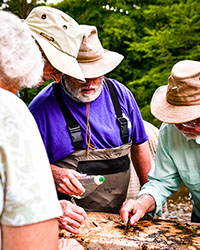 We are excited to announce we are in the final stages of a new database upgrade for the Missouri Stream Team program. This new database will help volunteers enter more accurate data by automatically reviewing for potential errors. This means the system will only allow data to be entered that meets the standard protocols taught at Stream Team trainings. When it comes to water quality monitoring, the system will only allow submission of data within the expected range. For example, the system will not allow a monitor to submit a temperature reading of 80 degrees Celsius; that is far too toasty for our streams! For accepted data, the system will automatically assign a Quality Control (QC) Level. If submitted data is questionable that protocols were followed, the system may flag it with a QC Level of Educational. If submitted data follows protocol and is within acceptable ranges, it will receive a QC Level of Quality Assured. Program staff will always have the ability to edit a datasheet’s QC level if necessary.
We are excited to announce we are in the final stages of a new database upgrade for the Missouri Stream Team program. This new database will help volunteers enter more accurate data by automatically reviewing for potential errors. This means the system will only allow data to be entered that meets the standard protocols taught at Stream Team trainings. When it comes to water quality monitoring, the system will only allow submission of data within the expected range. For example, the system will not allow a monitor to submit a temperature reading of 80 degrees Celsius; that is far too toasty for our streams! For accepted data, the system will automatically assign a Quality Control (QC) Level. If submitted data is questionable that protocols were followed, the system may flag it with a QC Level of Educational. If submitted data follows protocol and is within acceptable ranges, it will receive a QC Level of Quality Assured. Program staff will always have the ability to edit a datasheet’s QC level if necessary.
Learning is a never-ending process; if you need a refresher or are new to the program, you can review Stream Team protocols on our website or our Missouri Stream Team YouTube channel. For those that monitor frequently, please consider attending a Level 2 Volunteer Water Quality Monitoring training. By attending this advanced training, you will come away with greater confidence in your methods and data. Keep in mind, that the data that you submit is a way that not only you can educate yourself, family, and friends about your streams and watersheds, but it is also a way that we can have a baseline understanding of our stream resources. Throughout the transition to the new database, our staff will be here to help and to ask follow-up questions about your data when needed. As always, thank you for your time and dedication. See you on the river!
Since our last issue of Channels, Stream Team members reported:
- 647 total activities
- 3773 total participants
- 16051 hours
- 34 tons of trash collected
- 108 water quality monitoring trips
- 234 litter pick-ups
Check out more highlights below . . .
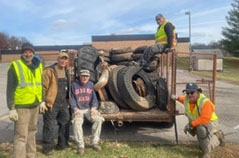
Arnold Stream Team – The Mighty #211 – The Mighty 211 held a Black Friday Tire and Trash Pick-Up led by Bernie Arnold. 21 volunteers participated in the effort and collected 98 tires, 1,620 pounds of scrap metal, and several cubic yards of trash. Wow!
%2c%20lpu-20231019%2c%20tributary_to_brushy_creek_pettis_county%20riffle%20review.jpg?crc=4154885955) City of Sedalia Stormwater – Stream Team #3205 – The City of Sedalia’s Stormwater Coordinator Brittany Wilbanks led a litter pick-up on a tributary to Brushy Creek with 37 freshman from Smith Cotton High School’s biology classes and their faculty. The students ended up picking up 36 small red bags, 20 medium yellow bags, and 6 large green bags of trash off the landscape in just 2 hours. Amazing!
City of Sedalia Stormwater – Stream Team #3205 – The City of Sedalia’s Stormwater Coordinator Brittany Wilbanks led a litter pick-up on a tributary to Brushy Creek with 37 freshman from Smith Cotton High School’s biology classes and their faculty. The students ended up picking up 36 small red bags, 20 medium yellow bags, and 6 large green bags of trash off the landscape in just 2 hours. Amazing!
%2c%20wqm-20231105%2c%20trib_jordan_creek_south_branch_greene-2-crop-u18929.jpg?crc=348343271) Missouri State University Wildlife Society – Stream Team #6499– 6 student members of Missouri State’s Wildlife Society went out in November to study Jordan Creek’s water quality; this was their first ever monitoring session as a Missouri Stream Team. Congratulations!!
Missouri State University Wildlife Society – Stream Team #6499– 6 student members of Missouri State’s Wildlife Society went out in November to study Jordan Creek’s water quality; this was their first ever monitoring session as a Missouri Stream Team. Congratulations!!
The 100 Club
These are individuals that have contributed more than 100 hours since the last issue:
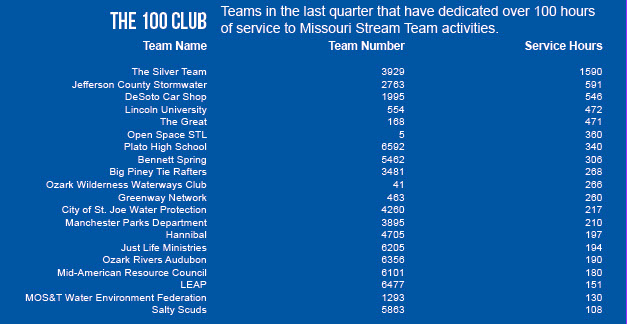
 Call for Water Advocates in 2024
Call for Water Advocates in 2024
By Mary Culler, Stream Teams United Executive Director
The New Year is still on the horizon, but it is already clear there will be a need for Missourians to advocate for our state’s waters in 2024. Following the decision of the U.S. Supreme Court on May 25, 2023, in the case of Sackett v. Environmental Protection Agency, states are beginning to interpret what the Supreme Court decision means for regulation of waters within their respective states. In Missouri, the Missouri Clean Water Law 644.016(27) defines “waters of the state”, those waters that are subject to regulations of state law. The opinion of the Supreme Court in the case of Sackett v. EPA provides great depth and more information about the court’s decision and its interpretation of waters of the U.S.
The current definition of Missouri’s “waters of the state”, provides for a relatively wide and inclusive protection by state law over all rivers, streams, lakes and other bodies of surface and subsurface water lying within or bordering the state (except those waters found entirely on a person’s private property). The current exact definition of Missouri’s “waters of the state” reads “all waters within the jurisdiction of this state, including all rivers, streams, lakes and other bodies of surface and subsurface water lying within or forming a part of the boundaries of the state which are not entirely confined and located completely upon lands owned, leased or otherwise controlled by a single person or by two or more persons jointly or as tenants in common”.
Our Missouri “waters of the state” definition has historically been broader than the interpretation of waters of the U.S., therefore, when it came to discharges of water pollution, the definition of waters of the U.S. was not as relevant for the state’s jurisdiction. Therefore, our state’s definition of “waters of the state” has offered protection of Missouri waterways from pollution discharges, despite the ongoing litigation and pending interpretations of “waters of the U.S.”.
However, we are now seeing a within state attack on Missouri’s “waters of the state” definition. During the first week of December, the first dates of which state legislation can be pre-filed for 2024, two bills HB1691, sponsored by Representative Dean Van Schoiack, and SB981 sponsored by Senator Rusty Black seek to remove protections from Missouri surface and groundwater.
These two bills seek to change the definition of Missouri’s “waters of the state” to be defined as “all relatively permanent, standing, or continuously flowing rivers, streams, lakes, and ponds lying within or forming a part of the boundaries of the state that are not entirely confined and located completely upon lands owned, leased, or otherwise controlled by a single person or by two or more persons jointly or as tenants in common. Lakes and ponds shall have a continuous surface connection to a relatively permanent, standing, or continuously flowing body of water. Waters of the state includes: (a) Wetlands adjacent to relatively permanent, standing, or continuously flowing bodies of water identified with a continuous surface connection to those waters; and (b) Subsurface aquifers that have a surface connection with relatively permanent, standing, or continuously flowing rivers and streams.”
While this new proposed definition of Missouri’s “waters of the state” is much longer than the current definition, and is more complex to interpret, what it does is quite simple: it serves to remove protections of some wetlands, intermittent and ephemeral streams, and groundwater from jurisdiction of Missouri’s Clean Water Law, and it makes the interpretation of what is considered a “water of the state” much more confusing and less straightforward compared to our existing definition.
While Missouri has been somewhat immune to the back-and-forth interpretation of “waters of the U.S.” when it comes to discharges of water pollutants, this proposed change to Missouri’s “waters of the state” poses clear danger to future protection of Missouri’s surface and groundwater resources, and all the living organisms and people who use these resources.
I invite you to join Stream Teams United in speaking up for the protection of Missouri’s waters in 2024. On April 18th, we will be hosting our 3rd annual Clean Water Day/Great Rivers State Day at the Missouri State Capitol. Save the date and plan to participate, but also stay tuned to our weekly e-bulletin and social media @mostreamteam for calls to action related to this proposed legislation. Missouri’s waters are the envy to many of our neighboring states, and those states to our west. 2024 will be a year that water advocates will need to be the voice of our waters. If you would like to be more involved with advocacy efforts (either as a volunteer intern, member of the Stream Teams United advocacy committee, or as a Stream Teams United Board member as our Advocacy Representative), contact mary@streamteamsunited.org or by phone at 573-586-0747.
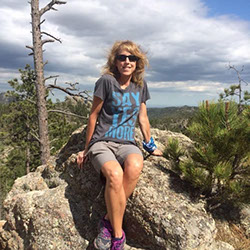 Welcome Cheri
Welcome Cheri
By Cheri Becker, Volunteer Engagement Assistant
& Foreword from Cara Coates, Volunteer Engagement Specialist
Please join me in welcoming Cheri Becker to the Missouri Stream Team Program. Cheri has been a dedicated volunteer in water stewardship for over 10 years, and it is a joy to have her on our team. Cheri started on November 1 and is located at Columbia Bottom Conservation Area’s office in North Saint Louis at the confluence of the Missouri and Mississippi Rivers. Learn more about Cheri in her own words below and please give her a call to welcome her to the Saint Louis Region if you have the time:
“I am of the generation that grew up wandering, exploring, and playing outdoors and in the woods. Being in the woods and on the river is both exhilarating and peaceful and is where my heart feels at home. Throughout my young life I developed a passionate love and unending curiosity for the natural world. I find sharing that love and enthusiasm with others and helping them find their personal connection with Nature to be very rewarding.
I am passionate about protecting, preserving, and restoring Nature and working toward creating a better world where everyone has access to clean water, clean air, and a safe environment. I made a career change joining the Missouri Department of Conservation team so that my work life aligns with that passion and my personal mission to be a catalyst for change.
I have decades of experience directing events, engaging volunteers, coaching, and presenting educational clinics through my work with the Gateway Region YMCA and in my capacity as a coach and volunteer with numerous organizations.
As a life-long volunteer, I believe empowering individuals to come together for a common cause is key to making a difference. When we work together, we create a significant impact. We should strive to be the change that we want to see. I am excited to live that philosophy through working with the Missouri Department of Conservation Missouri Stream Team program. Water is life and the mission could not be more important.
When not at work, I can be found outdoors in the woods or on the river hiking, paddling, running, backpacking, cycling, and generally enjoying and photographing all aspects of Nature. I share my time outdoors with my husband, Joe, who is just as passionate as I am. We have a dog named Pip and a turtle named Fish. Joe and I each have two children, Natalie and Nick, and Danielle and Josh. We all share an incredible passion for the natural world and enjoy special family time together hiking and kayaking.”
Phone: 573-522-4115, Ext. 3124
Email: Cheri.Becker@mdc.mo.gov
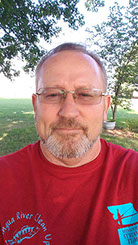 Farewell Carl
Farewell Carl
Foreword By Rebecca O’Hearn, Volunteer Unit Supervisor
After 15 years as a Stream Team Assistant, Carl Romesburg has retired. Carl’s years of service for MDC started in 2006 as a volunteer for the Stream Team Program. After 2 years of volunteering he was offered the Stream Team Assistant position in southern Missouri. Carl was an excellent Stream Team staffer. He was very approachable and easily connected with educators and children. During this past year, he helped the Stream Team Program through some tough times by traveling outside of his regions and putting in extra hours to deliver excellent educational programs to volunteers, Missouri teachers, and their students. Carl will certainly be missed in the Volunteer Unit. Carl’s official last day was October 31st.
Below is what Carl said about his retirement,
“After 15 years as a Stream Team Assistant it is time to pass the torch. I have truly enjoyed my position in the Program. Thanks to all my co-workers for your support and dedication to the Stream Team. You made my work environment a great place to be. To all the volunteers I have had the opportunity to work with, I thank you! You gave me a new perspective toward the program. Your commitment and dedication is over the top! I will always be a part of the Missouri Stream Team Program. See you on the river!”
.
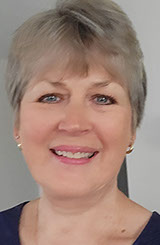 Farewell LuAnn
Farewell LuAnn
By Cara Coates, Volunteer Engagement Specialist & Kelly Reinkemeyer, Relevancy Branch Administrative Assistant
After 9 years with the Missouri Stream Team Program, LuAnn Rockelman retired in November. LuAnn’s years of service as our Stream Team Administrative Assistant started in April of 2014. LuAnn was an excellent member of our team; she always came to work with a smile, took the hardest part of our job and made it look so easy. During the past two years, LuAnn has picked up more administrative work when we needed her, and we are so grateful for her extra time and dedication. LuAnn will be missed by our Volunteer Unit and our Stream Team family.
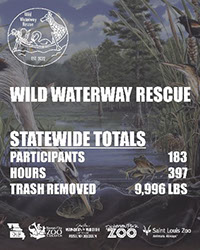 Wild Waterway Rescue
Wild Waterway Rescue
By Cara Coates, Brian Waldrop, & Jeff Cantrell, Volunteer Engagement Specialists
Thank you to everyone who participated in the second year of the Wild Waterway Rescue Challenge! This event featured the opportunity to support your favorite zoo or aquarium in Missouri – Kansas City, Saint Louis, Dickerson Park Zoo, or Wonders of Wildlife – while keeping our waterways clean at the same time. From November 1st to the 12th, a total of 183 participants dedicated 397 hours to removing 9,996 lbs of trash from their adopted streams in the name of aquatic and wildlife habitat protection. Among the four zoos, participants collected the most trash in support of the Saint Louis Zoo, which will claim the trophy for the 2023 challenge.
Stay tuned for the next challenge this upcoming fall!
%2c%20lpu-20231112%2c%20dickerson_branch_of_dry_sac_river_greene.jpg?crc=438809190)
%2c%20lpu-20231112%2c%20tributary_to_river_de_peres_st_louis_county-1.jpg?crc=135733342)
%2c%20lpu-20231112%2c%20tributary_to_river_de_peres_st_louis_county-2.jpg?crc=4175798153)
%2c%20lpu-20231112%2c%20tributary_to_river_de_peres_st_louis_county-3.jpg?crc=3872112278)
%2c%20lpu-20231104%2c%20fassnight%20park%20springfield%2c%20mo.jpg?crc=3845443309)
How Our Volunteers Make Third Spaces & Create Communities
Stream Team Trip Leaders
Announcements, Activity Prizes, and more!
Monitoring Minute
Riffle Review
Coalition Corner
Welcome Cheri
Farewells
Wild Waterway Rescue
lpu_20230916)_meramec_river_franklin_county%20stream%20reach-crop-u18881.jpg?crc=3855062403)

Winter 2024